Personal Details
The Rev Richard William Dugdale MC CF, born in Salisbury, Wiltshire in 1889, the second son of The Rev Sidney and his first wife Edith Dugdale of The Rectory, Whitchurch.
Richard attended Rugby School; after leaving Rugby in 1908 he went up to Corpus Christi College, Oxford where he read classics. He graduated with a BA in 1912, and an MA in 1915. He trained for ordination to the Clergy at Bishop’s Hostel in Farnham, Surrey and was ordained Deacon at Worcester in December 1913 and a Priest a year later. He served as Curate at Rugby from 1913 to 1915 during which time he was initiated into the Freemason Lodge of Rectitude in Rugby.
Military Details
Regiment : Royal Army Chaplains' Department, attached to 1st Battalion, The Norfolk Regiment
Rank : Chaplain 4th Class
Service Number :
Killed in Action; France 24th October 1918 Age 28
His Military Cross citation read: "For conspicuous gallantry and devotion to duty. He tended the wounded under very heavy fire without the slightest regard for his own personal safety. He located wounded men in the most advanced positions and guided stretcher parties to bring them in."
The Military Cross is the third-level military decoration awarded to officers and (since 1993) other ranks of the British Armed Forces, and used to be awarded to officers of other Commonwealth countries.
The Military Cross is granted in recognition of "an act or acts of exemplary gallantry during active operations against the enemy on land to all members, of any rank in Our Armed Forces". In 1979, the Queen approved a proposal that a number of awards, including the Military Cross, could be awarded posthumously.
Click on the tag below to see details of each recipient.
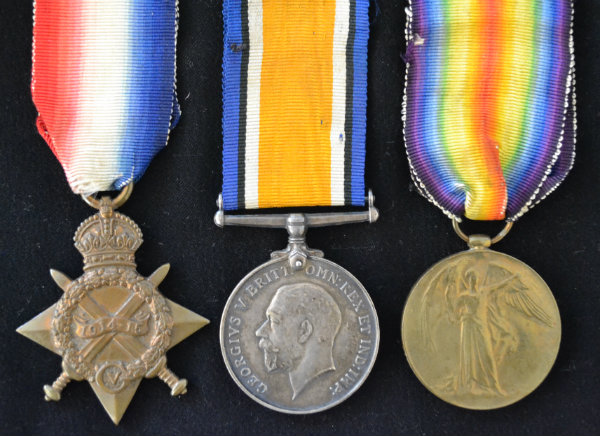
The 1914 Star (also known as 'Pip') was authorised under Special Army Order no. 350 in November 1917 and by an Admiralty Fleet Order in 1918, for award to officers and men of the British and Indian Expeditionary Forces who served in France or Belgium between 5 August and midnight of 22–23 November 1914. The former date is the day after Britain's declaration of war against the Central Powers, and the closing date marks the end of the First Battle of Ypres.
The 1914–15 Star (also known as 'Pip') was instituted in December 1918 and was awarded to officers and men of British and Imperial forces who served against the Central European Powers in any theatre of the Great War between 5 August 1914 and 31 December 1915. The period of eligibility was prior to the introduction of the Military Service Act 1916, which instituted conscription in Britain.
The British War Medal (also known as 'Squeak') was a silver or bronze medal awarded to officers and men of the British and Imperial Forces who either entered a theatre of war or entered service overseas between 5th August 1914 and 11th November 1918 inclusive. This was later extended to services in Russia, Siberia and some other areas in 1919 and 1920. Approximately 6.5 million British War Medals were issued. Approximately 6.4 million of these were the silver versions of this medal. Around 110,000 of a bronze version were issued mainly to Chinese, Maltese and Indian Labour Corps. The front (obv or obverse) of the medal depicts the head of George V. The recipient's service number, rank, name and unit was impressed on the rim.
The Allied Victory Medal (also known as 'Wilfred') was issued by each of the allies. It was decided that each of the allies should each issue their own bronze victory medal with a similar design, similar equivalent wording and identical ribbon. The British medal was designed by W. McMillan. The front depicts a winged classical figure representing victory. Approximately 5.7 million victory medals were issued. Interestingly, eligibility for this medal was more restrictive and not everyone who received the British War Medal ('Squeak') also received the Victory Medal ('Wilfred'). However, in general, all recipients of 'Wilfred' also received 'Squeak' and all recipients of The 1914 Star or The 1914/1915 Star (also known as 'Pip') also received both 'Squeak' and 'Wilfred'. The recipient's service number, rank, name and unit was impressed on the rim.
Further Information
Report in the Whitchurch Herald 2nd November 1918 relating to the death of The Rev Richard William Dugdale MC CF
"Chaplain Reverend Richard William Dugdale, attached to the Norfolk Regiment has been awarded the Military Cross; “He tended the wounded under heavy fire without the slightest regard for his own personal safety. He located wounded men in the most advanced positions and guided stretcher parties to bring them in”"
The sad news was conveyed to the family in the following telegram, which was received by the Rector on Monday evening last:
"Deepest regret Captain Rev. R W Dugdale MC attached to Norfolk Regiment Killed in Action October 23rd."
His Commanding officer writes:
"He was killed instantly by a shell which exploded in the Regimental Aid Post where he was sitting. By the death of this young officer, the Church, the State and the Army have lost a valuable promising life."
Whitchurch Herald 2nd November 1918
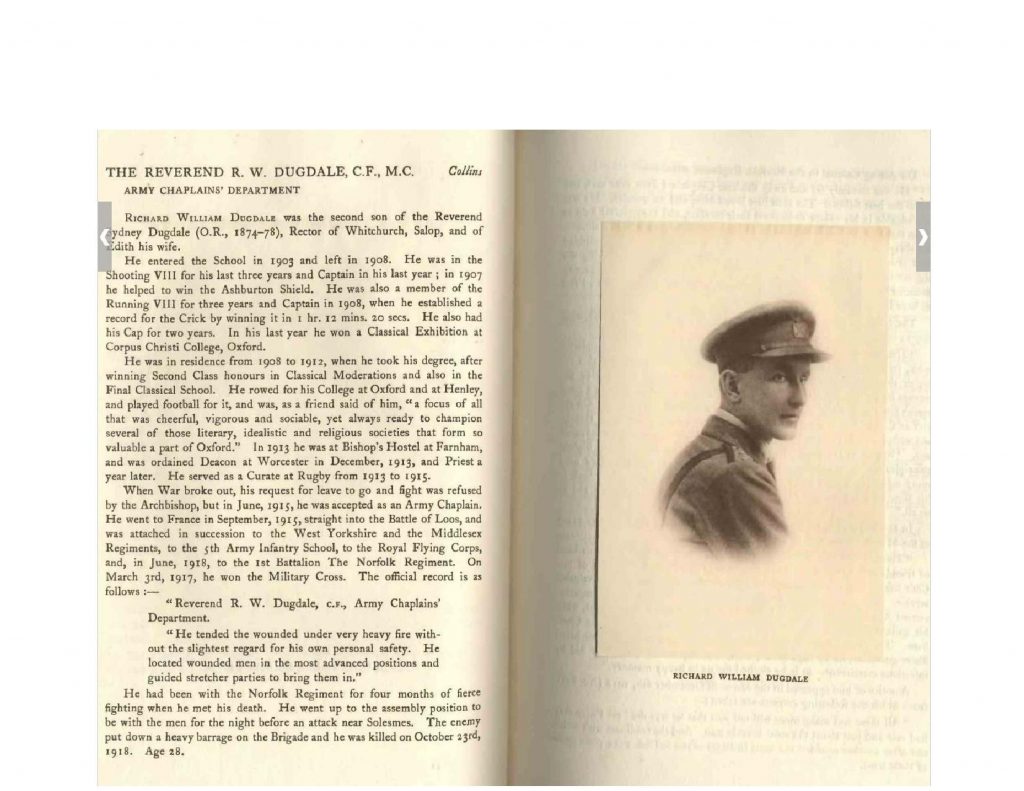
Taken from Forces War Records
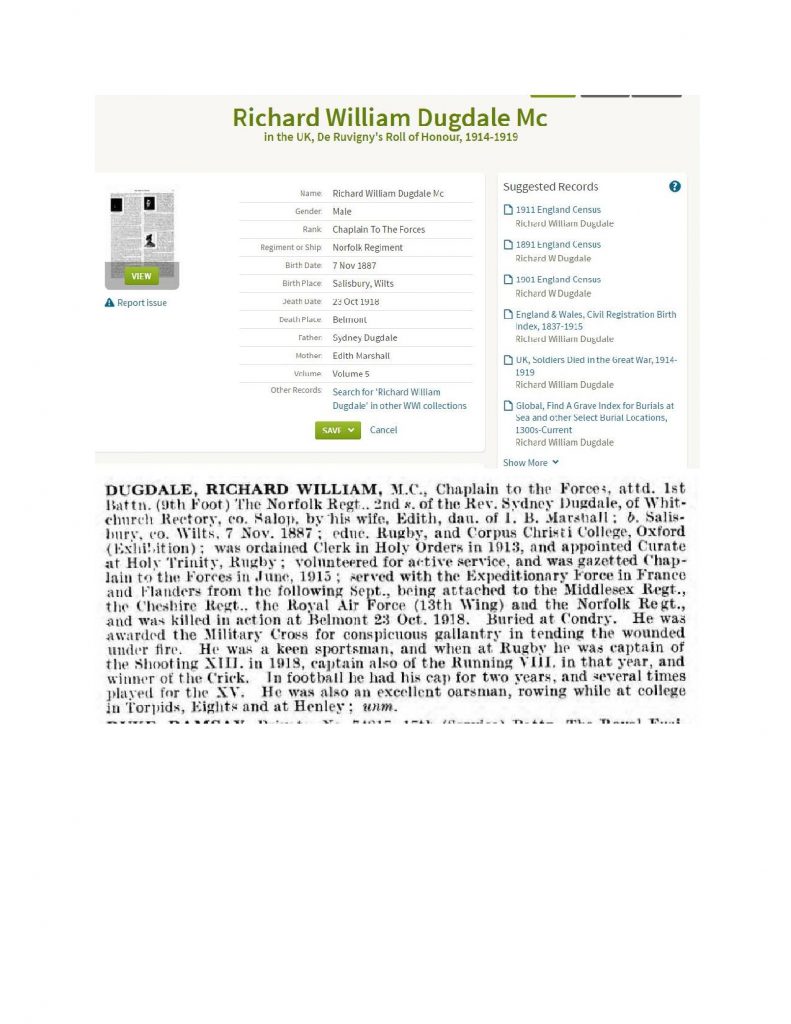
Taken from Forces War Records
Effects £2454 12s 1d.
Taken from Forces War Records
Coming from Rugby with a reputation as a great runner and athlete, and with a number of old school friends in the senior years, he was at once picked out as one of the leading spirits of his year and elected to all the College clubs. This position he held through. He took the lead and achieved distinction in every sphere – athletic, social, intellectual, and religious.
His intellectual development during his time at Oxford was remarkable. Being naturally of a sanguine and orthodox bent he was at first inclined to shrink from the more extravagant immaturities of some of his friends. But his natural inclination towards sympathy and understanding rather than dissent soon gave him the measure of this malaise of youth, and many a clever undergraduate learnt to take himself less seriously by finding his views listened to respectfully but not over-seriously by one so sane and large hearted.
Both in his work and his recreations he set himself a high standard. Aristotle’s Ethics became an adventure when tackled in Dick’s company in the spirit of a toughish climb up Skaw Fell. He had the natural man’s love of pleasure and idleness, and though effort and achievement seemed to come spontaneously, he used to confess an inward struggle to keep up to the mark. It was then in the most intimate moments that he would humbly avow his belief in prayer, and one got a glimpse of the strength and simplicity of his inmost springs of action.
Most loveable, most gentle, and most strong, he was the ideal type of Christian priest. The loss to the Church and to those who would have come under his spell is even greater than the loss to his friends and to those who have known him and treasure his memory. His enthusiasm for reform, his humanity, and his strength of purpose assured him a future rich in honour and full of benefit to his country. Cut short on the eve of victory, his life is an inspiration and example, and his death an earnest of the truth by which he lived”
If you can provide any further information on The Rev Richard William Dugdale please get in touch by leaving a comment below, using our Contact Form or by calling in to Whitchurch Heritage Centre.
Information provided by Terry Evanson Whitchurch, Shropshire and Whitchurch Museum and Archives

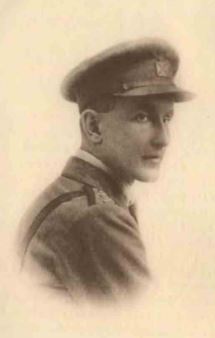
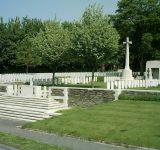
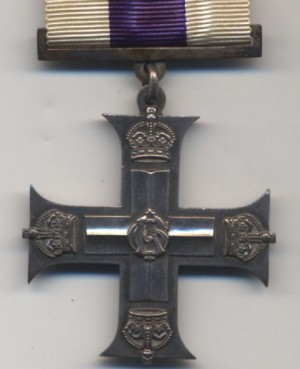
Richard Dugdale was my uncle. You have him as the son of Sydney and Phyllis Dugdale however he was the son of my grandfather’s first wife Edith (nee Marshall). My father was the youngest son of the second marriage to Phyllis, he was four when his brother died.
Many thanks for pointing out this error. Although all our research records gives his mother’s name as Edith for some reason it was changed to Phyllis on the post. A quick look at the 1911 census gives his age as 21 and Phyllis’s as 31 – so not really possible !
I am presently writing a history of the Dugdale family of Llwyn, as part of a wider study of that Welsh estate.
Dear DR Humphreys I see that you are writing a a history of the Dugdales and Llwyn . and would be most interested in your research. I am the son of Christopher Dugdale,( who changed his name to Fenwick when he inherited his cousin’s property). He was the youngest son of Sydney Dugdale, whose Grandfather John leased and subsequently bought Llwyn. I do have some information and papers concerning the family and would be pleased to help .
Yours sincerely
Julian Fenwick
Hello,
I am somewhat related to the Dugdale family. My great great grandfather was a older brother to Edith Dugdale nee Marshall. He immigranted to new zealand in 1877 name Alfred. He had 6 children my mother was his youngest son daughter. Alfred died in 1935. Roger my grandfather died 179, my mother Mollie Kroon ( nee marshall) died last year. I have done a family history as much as I could but would love to be in touch with some family. I now live in Canada, the rest of the family still in New Zealand, my uncle still owns the farm Alfred brought in 1877.
We have received your comment/enquiry and are looking at what we can find out about the Dugdale family in the UK. We will be in touch from our whshcvolunteer@gmail.com mail account shortly
Terry (Volunteer, Whitchurch Museum & Archives)